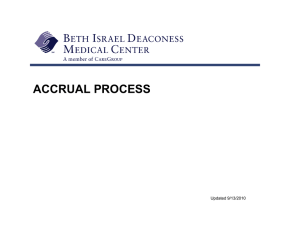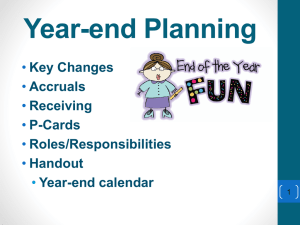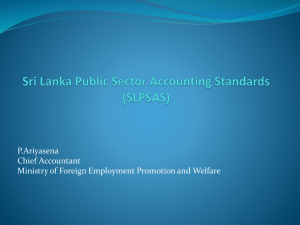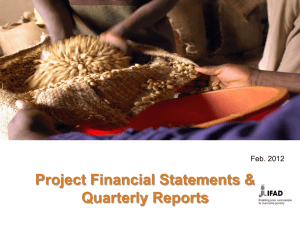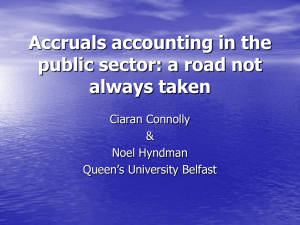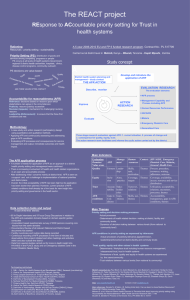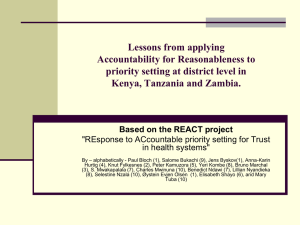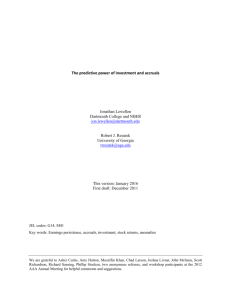Finance Update Sessions FY14
advertisement
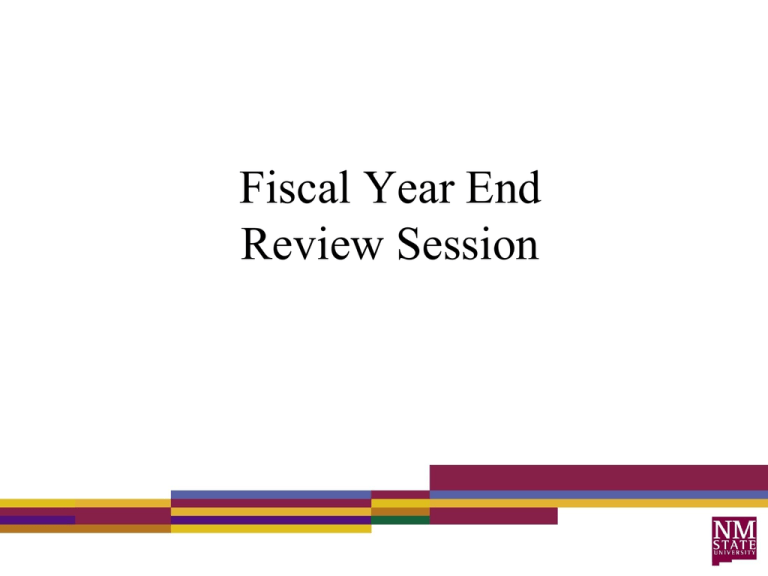
Fiscal Year End Review Session Agenda • • • • • • • • • • • • Year End Schedule Dual Year Processing Review of Indexes Purchasing Encumbrances Purchase Order Receiving Commodity Level Accounting for PO’s Accounts Payable Accruals Miscellaneous Questions Key Year End Dates – June 25 - DPRs, JVs and IDVs to be included in FY14 are due to Fiscal Monitor. – June 27 - Last day to purchase items from Bookstore. The Bookstore will not be closed during year end. – June 30 - any FY14 ELRs must be completed and approved by all parties. – July 1 - Preliminary 1 Close Key Year End Dates, cont. – July 7 - P-Card transactions through 6/19/2014 will be posted to Banner. – July 7 - Deadline for JVs from Business Managers and Research Centers – July 10 - Preliminary 2 Close – July 17 – Controller Close – starting at 5:00pm – July 22 - Final Close reports available after 5:00pm Dual Year Processing • You may begin processing FY15 purchase requisitions on June 2, 2014 • Creating a FY15 requisition during the Dual Year period: -Transaction Date must be >June 30, 2014 -Delivery Date must be > Transaction date Dual Year Processing, cont. Transaction Date vs. Activity Date • Transaction Date – Banner posts transactions to fiscal years and periods based on the transaction date. • Activity Date – The date a transaction is actually entered into Banner. Reviewing Funds • General Ledger Review – Review Assets, Liabilities and Fund Balance • Look for reverse balances • Compare for no change from prior year • AFR exception reports will help identify issues, but don’t wait for them. Reviewing Indexes • Unrestricted Funds – I&G and Non I&G Funds • Compare current year activity to prior year activity • Question any expense with a credit balance • Verify that there is not any YTD expense activity in account code 799800 • Compare budget to actual expenses Reviewing Indexes, cont. – I&G Funds • There should not be any YTD activity in the following account codes – Revenue accounts – Resale accounts – Applied charges accounts, 795xxx (except in specific circumstances) Reviewing Indexes, cont. – Non I&G Funds • Question any revenue that has a debit balance • Verify that any resale account codes, 77xxxx are appropriate on that index. Reviewing Indexes, cont. • Zero all default P-card account codes - 738010 and 738011 • Federally excluded account codes • Requesting back up documentation for journal vouchers versus using various reports with transaction detail (ex: COGNOS, JV text or BDMS) Reviewing Indexes, cont. • Restricted Funds – Various State of New Mexico billings have a quicker than normal turnaround time. • Be prepared to submit final expenditures in order to avoid the risk of late billing which could result in the agency refusing to pay. – Departments should continuously review any accounts receivable balances that are 120 days or older and support SPA in collection efforts, to avoid the write off of receivables at year end. Purchasing • Clean up Incomplete Purchase Requisitions – Review Banner FOADOCU (Document by User) – Refer to Banner Finance Manual for process to delete a requisition Purchasing, cont. PCard FY 14 Deadlines • Last FY14 PCard cycle 6/6/14 – 6/19/14 • PCard transactions posted in WellsFargo by 6/19 will be posted to FY14 • PCard transactions posted in WellsFargo after 6/19 will be posted to FY15 • Business managers will be contacted to assist with outstanding PCard balances in their areas Encumbrances • Review Open Reservations and Open Commitments – Use Finance Self-Service • View Reservations –Budget Queries –Operating Ledger Data Column, check reservations –Input Index Encumbrances, cont. Check Reservations Encumbrances, cont. Drill down on account code Encumbrances, cont. View list of reservations Purchasing, cont. • View open encumbrances – Encumbrance Query – Input Index number Purchase Order, cont. All POs for fiscal year will appear Purchasing, cont. • Completion of Receiving – Banner FOIDOCH • Document History Purchasing, cont. Purchase Order • Purchase Order History – Finance Self-Service • View Documents by Purchase Order – All transaction associated with Purchase Order – Invoice will show summary of Purchase Order Purchase Order, cont. All transactions related to PO Purchase Order, cont. Summary of PO Commodity Level Accounting for PO’s • Commodity Level Accounting is a way of processing requisitions in which each “line” (commodity) of the requisition has its own accounting distribution -When using multiple FOAPALS, you can identify a specific item to be paid by a certain FOAPAL -Payment distribution can specify a dollar amount given for a FOAPAL -Once invoiced each line will be paid as indicated on FOAPAL distribution -A change in FOAPAL can be made Commodity Level Accounting for PO’s, cont. • Commodity Level accounting is the default on all purchase requisitions • Use Commodity Level in these instances: – Mixed Commodities – Mixed FOAPALS – Asset Tags required Commodity Level Accounting for PO’s, cont. Original PO Commodity Level Accounting for PO’s, cont. Invoice Commodity Level Accounting for PO’s, cont. Invoice, cont. Purchasing • Reminders on Purchase Requisitions using the FPAREQN form: – Requestor/Delivery Information tab • Input phone number and email address – Item text versus Document Text • Item text expands on description of item • Document text applies to information related to the whole purchase requisition (example: enter free form information and select clauses) Purchasing, cont. – Assign clauses • 03 Federal Grant • 04 Federal Contract • 08 Delivery Before July 1 • 14 Delivery After July 1 • 63 End of Year Payment Delay – List commodity items separately, do not combine Purchasing, cont. • FGRIDOC (Incomplete Document Listing) – E-print • FPIOPOF (Open Purchase Orders) – Banner Screen Accounts Payable • Notable Dates – Remaining FY14 PO invoices will not be paid between 2nd and 3rd close – FY15 PO invoices will not be processed until July 1st – Between 2nd and 3rd close, only FY15 PO invoices will be paid. FY14 encumbrances will not be rolled forward to July until 3rd close (July 17) – NOTE: All DPRs received after June 30, 2014 will be posted in FY15 Accruals • Full accrual financial statements require income to be reported when earned and expenses to be reported when incurred. • Our financial statements must include all revenue earned and expenses incurred in FY14, even if the transactions have not been completed. The year end accruals adjust the revenues and expenses that are in Banner to amounts required for full accrual financial reporting. Accruals, cont. • Types of Accruals – – – – Three-way match Two-way match Subcontractor Construction Accruals, cont. Purchase Order Definitions – Two-way match • The terms of the PO requires that the invoice be matched to a line on the PO before the invoice can be paid. – Three-way match • The terms of the PO require that the invoice be matched to the PO, and that the goods/services have been received in Banner, before the invoice can be paid. Accruals, cont. • There is a process that automatically identifies and posts three-way match PO accruals. The criteria used to identify the amount to be accrued are: – As of June 30, 2014 • A valid three way match PO exists • Goods/services have been received in Banner • The Invoice has not been posted in Banner Accruals, cont. • The accrual process for two-way match POs isn’t that easy - you must tell us which of your two-way POs should be accrued and how much we should accrue. • COGNOS form is FI-Det-Two Way PO Encumbrance – If you received the goods or services on or before June 30, 2014 the value of those goods or services should be accrued. • PO balances for plant funds charged to account codes 754x, 782x, 783x and 792x will not appear on the twoway report. These POs are included in the Construction or Subcontract accrual reports. Accruals, cont. • Subcontract accrual process: – AFR uses a COGNOS report to identify subcontractors. – Banner Subcontract form is FGIENCD – Each department will be sent a list of their subcontracts and asked to provide information on any services rendered before 7/1/14 that have not been billed to the University. – Based on information received, AFR will post the subcontract accrual. Accruals, cont. • Construction accrual process: – Facilities and Services are given a list of open PO balances associated with large construction projects. – Facilities and Services personnel review the POs and if necessary, contact the vendors to determine the appropriate accrual. – AFR posts the accrual based on information provided. Accruals, cont. • Details of the Two Way Accrual Process: – AFR runs a COGNOS report that lists open two-way match POs. – Each department will receive a list of their open twoway match POs for review. – Departments are asked to review the information and provide AFR with a list of the POs should be accrued for year-end, and the amount of each accrual based on invoices or correspondence from the vendor. FIP JV Processing • Electronically Routed JVs (JEC/JED, B4C/B4D) – These must be routed through Banner queues for approval, so consider the timing when close to month end • Electronic JVs (JE16s, CR05s, &c) – Consider FIP and Fiscal Monitor deadlines – Hard copies requiring fiscal monitor signatures – Physical copy & electronic copy sent to fiscal monitors who forward them to FIP after review • Manual entry (IDVs, CR05s, &c) – Less than ten lines – Consider FIP and Fiscal Monitor deadlines • Plan ahead! Errors cause delays. FIP JV Processing • Electronically routing JVs– Remember that year end is a busy time, so plan ahead to avoid delays. • Uploads requiring signatures– Non-routing uploads (JE16s, etc) must come to FIP from fiscal monitors. • Posting schedule– Uploads submitted late in the period may be delayed by errors. Timely and early submission to fiscal monitors will help avoid delays. FIP JV Processing • Errors will cause delays in processing • Tips to avoid common errors: – – – – – Make sure index is valid (i.e., not termed, etc.) Make sure username is authorized to post Double-check account numbers Use the correct spreadsheet (JE16 vs. JED, etc) Make sure transaction date is in the current open period Miscellaneous • Electronic Processing (Uploads) of Budget, Journal Vouchers, and Cash Entry Vouchers is mandatory for entries with over 10 lines. • Routing Reminders: – If there are any restricted funds - route the electronic file to SPA. – If there are no restricted funds – route the electronic file to AFR Upload Templates Ben Glickler – FIP bglickle@nmsu.edu Cynthia Vigil – AFR cvigil02@nmsu.edu Lesley Doyle – AFR ldoyle@nmsu.edu Rennette Apodaca – Purchasing rennette@nmsu.edu Robert Valdez – Property Accounting rovaldez@nmsu.edu ? ? ? ? ? ? ? Questions? ? ? ? ? ? ? ? ? ? ? ? ?
